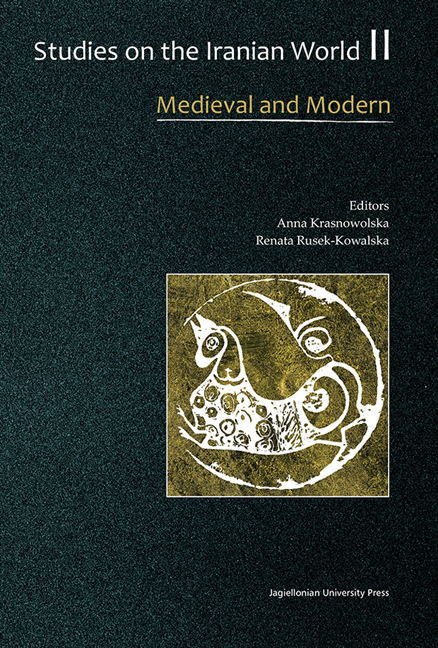Book contents
- Frontmatter
- Contents
- Foreword
- Linguistics
- Literature
- Religion
- History
- The Failure of the Constitutional Monarchy in Iran: The Socio- and Psycho-Genesis of Reza Khan's Rise to Power
- Concerning One Unpublished Persian Historical Document from Afshar Period
- Clash or Compromise? Mongol and Muslim Law in the Ilkhanate (1258–1335)
- New Insights on the Fiscal System of the Early Ilkhanids through the Analysis of al-Murshid fī al-Ḥisāb, an Unknown Accounting Manual
- Archaeological Survey of Kamar-e Marj Castle in Kermān Province
- Historians of their Time: Mongols, Mamluks and the Treatment of the Past
- Arts
- Social and Cultural Studies
The Failure of the Constitutional Monarchy in Iran: The Socio- and Psycho-Genesis of Reza Khan's Rise to Power
from History
Published online by Cambridge University Press: 12 January 2018
- Frontmatter
- Contents
- Foreword
- Linguistics
- Literature
- Religion
- History
- The Failure of the Constitutional Monarchy in Iran: The Socio- and Psycho-Genesis of Reza Khan's Rise to Power
- Concerning One Unpublished Persian Historical Document from Afshar Period
- Clash or Compromise? Mongol and Muslim Law in the Ilkhanate (1258–1335)
- New Insights on the Fiscal System of the Early Ilkhanids through the Analysis of al-Murshid fī al-Ḥisāb, an Unknown Accounting Manual
- Archaeological Survey of Kamar-e Marj Castle in Kermān Province
- Historians of their Time: Mongols, Mamluks and the Treatment of the Past
- Arts
- Social and Cultural Studies
Summary
SUMMARY
A more realistic explanation of Reza Khan's seizure of power can be achieved by examining the long-term social and political developments preceding and following the Constitutional Revolution in Iran. Special attention should be paid not only to the increasing ‘power chances’ of Reza Khan as a single person in Iranian society, but also to the increasing ‘power chances’ of his position in a hierarchical structured society. In particular, more light should be shed on the contribution of the ‘Constitutionalists’ themselves to this seizure of power and accordingly to the ‘failure’ of their own ‘Constitutional Monarchy. ‘A theoretical model can be developed by using this example, which can provide insight into institutional de‑democratisation processes in different structured societies. Similar de‑democratisation processes are already worked out based on social and political developments in France (1848–1852) and Germany (1918–1933).
INTRODUCTION
The process of Reza Khan's rise to power in 1921 is not independent of the events leading up to and the aftermath of the 1906 ‘Constitutional Revolution’ in Iran. If this process is only to be explained in terms of the extraordinary capabilities of Reza Khan as a person or because of ‘the British conspiracy’, it corresponds little to the complex reality of social and political processes at empirical study of a longer-term perspective, is one able to come closer to the real structure of these processes. In the absence of a proper understanding of the events before and after the Constitutional Revolution, one is liable to succumb to voluntaristic and conspiratorial explanations of Reza Khan's rise to power. The more important question concerning the personality structure of a large number of people, especially the political actors, who contributed to these institutional de-democratisation processes is thereby neglected. This study suggests that the prevailing idealised image of the Constitutionalists as true democrats in literature about that period of Iranian history corresponds little to the reality of that time. A realistic consideration of the structure of these processes will support a more accurate depiction of the ‘Constitutional Era’ and later developments.
- Type
- Chapter
- Information
- Studies on the Iranian WorldMedieval and Modern, pp. 159 - 174Publisher: Jagiellonian University PressPrint publication year: 2015



